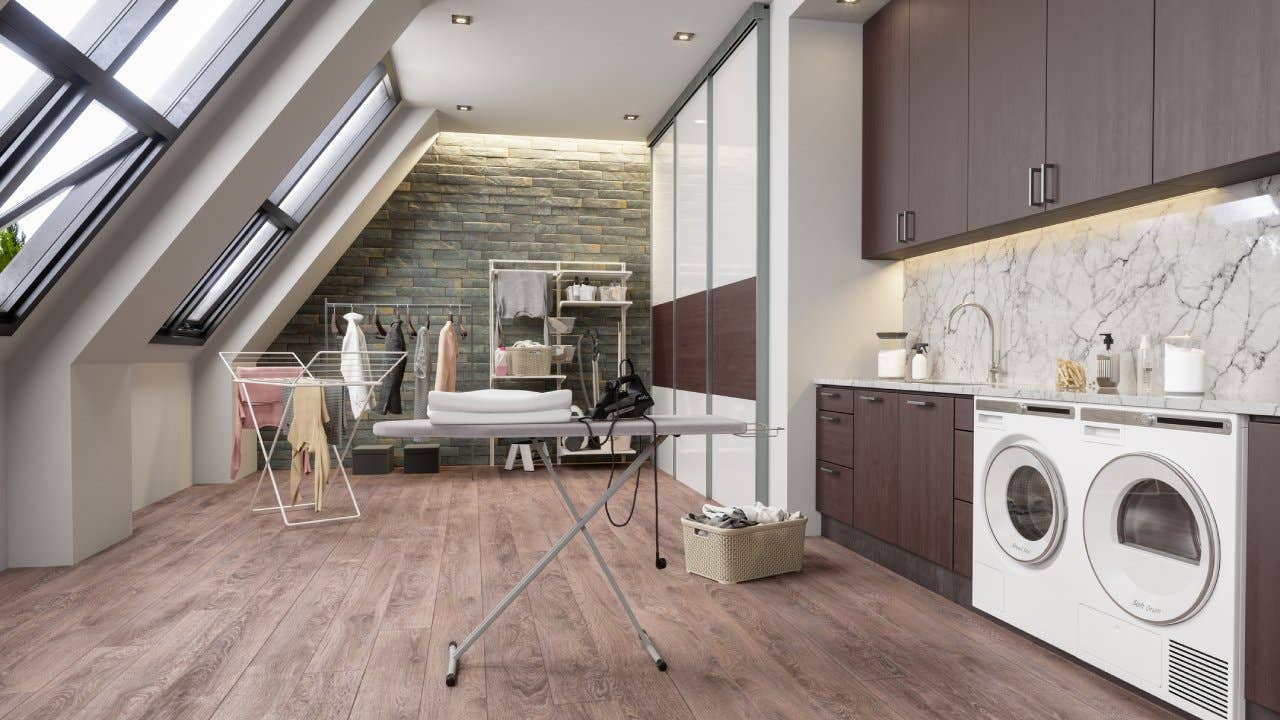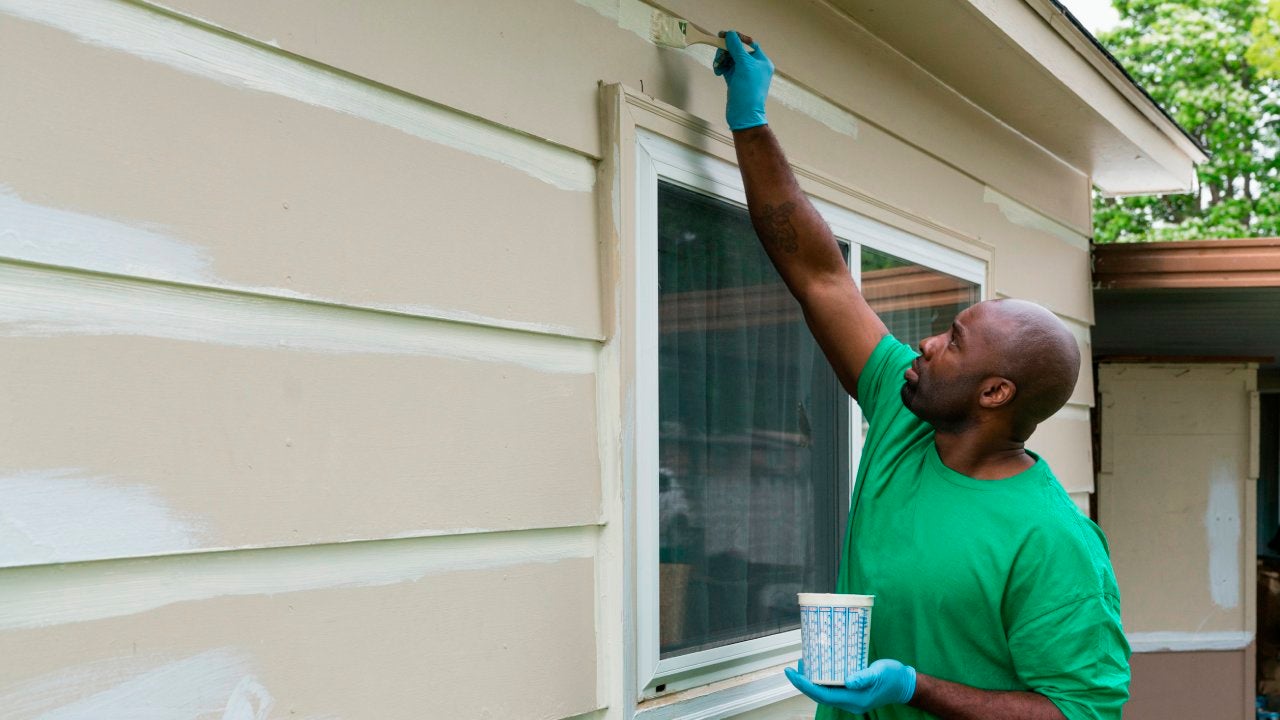The latest laundry room ideas: design trends, space-savers and smart appliances

No one ever loves doing laundry. But given that you spend a regular part of your month or week washing clothes, why not make the area as attractive and organized as possible? A well-designed laundry room isn’t just about making the space pretty, but about improving its functionality and efficiency.
Here are some ideas for the laundry room — trends in design, appliances and other furnishings that can enhance the clothes-washing experience. Even make it enjoyable.
Designing the laundry room
Laundry room design centers on the washer and dryer, naturally. But you need to account for certain other basics, including counter areas and storage zones.
While you may not have much control of where to put the washer and dryer — that depends on the hookups — consider setting aside space for the following:
- Counter space for folding and sorting: A small table or a small island could work.
- Laundry baskets, hampers or bins: To hold and sort dirty laundry or clean clothes.
- Shelves or cabinets: To hold detergents/bleaches, baskets, mesh bags and other supplies.
- Hooks or a rack: To hang or air-dry select items.
- A sink (optional): For hand washing or rinsing.
If you can’t have a separate room, create a designated laundry area by adding the washer and dryer to a corner of a large kitchen, or even stacking them in a closet. Just remember there is more to a laundry space than these appliances, so be sure you include counter areas — over the machines could work in a pinch — and a zone for storage, detergents, supplies, dirty clothes and baskets.
Multi-function laundry rooms
If, on the other hand, you do have a designated and large laundry room, consider adding elements to expand its uses. Some of the most popular laundry-room additions include a pet-washing station and a mudroom (with benches and open closets/hanging cabinets)
Furnishing the laundry room
Washers and dryers continue to improve in efficiency and variety. Following general trends in kitchen appliances, they’re getting slimmer, shorter and snazzier — cherry-red matte finish, anyone? — making them able to fit any space from inside a closet to under a counter to a full room.
Smart washers and dryers that connect and are operated via your phone/tablet or home Wi-Fi can help you save time on laundry days. They are usually more expensive than their conventional counterparts, but the positives outnumber the negatives, says Catherine Mack, co-owner of the House Buyer Network. “Although they come with a high price tag, they tend to be more energy efficient, integrate with [virtual assistants like] Alexa and are well worth the investment,” she notes.
You could use voice commands to run the machines, schedule a cycle to start or extend drying times straight from the app — just to name a few of the remote-controlled and AI functions. One of Whirlpool’s models, the 5.3 cu ft. Smart Top Load Washer, comes with an automatic detergent dispenser (good for 20 loads) and integrated pre-treat station. Basically a sink over the washer, it’s ideal when the space you are working with does not give you the option to have a dedicated sink.
Plus, Mack says, “Many of these machines run silently, meaning your laundry room no longer needs to be tucked away in an unused area of your home.”
Additional laundry room furniture
Space permitting, laundry rooms can be a repository for large, vertical cabinets — either free-standing or built-in — to store all sorts of cleaning equipment and supplies: vacuums, brooms, mops.
Cabinets can also be good concealing places. “Ironing boards can spoil the overall look and charm of your laundry room. However, there are some models these days that you can tuck inside a cabinet,” notes Alex Platt, a southeast Florida real estate broker. Other cabinets come equipped with slide-out shelves for drying or drapery rods on their undersides.
In addition, changing up the lighting (or adding more) in a laundry room can make it substantially more functional, not to mention upgrade its look. “Under-cabinet lighting strips can brighten up the darker spaces of your laundry room and provide the necessary illumination,” Platt says.
Styling the laundry room
When deciding on a style for your laundry room, anything goes these days — although it may be a good idea not to stray too far from the style of the rest of the home. The rustic, farmhouse look is particularly popular, though some opt for minimalist modern. After all, laundry rooms tend to get cluttery with piles of laundry and supplies, so the simpler and cleaner the decor, the better.
Little details can make a big difference, Platt points out. For example, adding a backsplash of white subway tile, stone or marble could elevate the space’s look. Renters who can’t or don’t want to invest in substantial changes can use adhesive backsplash options that look just like actual material.
Of course, don’t forget this is primarily a pace where you’re dealing with dirty clothes and items. Whites, grays and stainless surfaces and finishes are low-maintenance, classic and crisp. “You don’t want your flooring to get ruined because of one little accident,” says Kate Diaz, an interior designer and co-owner of Swanky Den. She suggests “durable flooring material that can withstand spills and puddles of water. The good news is, there are plenty of attractive water-resistant flooring options such as luxury vinyl planks that look just like real wood, or vinyl adhesive tiles in a variety of patterns and designs.
The final word on laundry room design
Laundry-room ideas are easiest to execute in a separate room. But really, any area where your washer and dryer are located becomes a laundry room, and it’s important to designate it as such. Regardless of whether you have a dedicated laundry room, a laundry closet or a corner of the kitchen, remember there is more to it than the washer and dryer. At the very least, be sure you include counter areas and a zone or furnishings for storage.
With just a few tricks, a laundry room can be perfectly functional and beautiful to boot.
You may also like

Best balance transfer cards with no balance transfer fee

Which home improvements add the most value?

What does an interior designer do?



